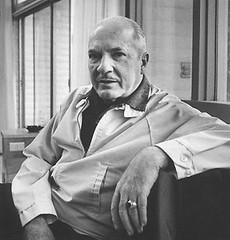
In Columbus Was a Dope by Robert Heinlein, scientific progress is described as an inevitability. It is human nature to desire progress and, over time, accept change caused by attempts to progress. Humans, as a species, are not content with the status quo. People are hungry for improvement and believe that everything can always be better. Heinlein demonstrates this through a conversation between acquaintances in a futuristic setting discussing the motivation of exploration.
It begins with a few men in a bar talking about an eminent voyage to Proxima Centauri. One of them, Dr. Appleby, is to be aboard the ship bound for the distant star. Mr. Barnes, one of the other men, is arguing with Dr. Appleby, writing off the adventure as a waste of time. When Barnes asks Dr. Appleby why he is taking the trip, inquiring what motivation he had for putting his life and the lives of his wife and daughter at risk, the Appleby responds, "It can't be explained... What took Peary to the North Pole? Why did Columbus get the Queen to hock her jewels? Nobody has ever been to Proxima Centauri — so we're going." In other words, he was going for the sake of progress. He was pushing his limits and the limits of human kind for the sake of advancement that he could not yet understand. Despite its mystery, Dr. Appleby felt this progress was still inexplicably important. Though he could see no gain from the expedition, he knew that it was so valuable that he was willing to give the rest of his life up to the journey, as it would take over sixty years. He knew that his children would be the ones to see the trip finished, and his grand children would be the ones to finally return, and he was willing to make this decision for all of them because he felt the allure of a new, exciting future so strongly.
Though Barnes couldn’t understand Dr. Appleby’s value in exploration for the sake of unknown progress, the kicker to this story is that the very place he was speaking was the result of people taking value such risks. Indeed, the bar that they were lightly conversing in was located on the moon, yet Barnes couldn't see the irony in his statements. This further demonstrates humanity's tendency to embrace change. Even though it was in Barnes's character to be satisfied with the status quo, the status quo that he accepts is the result of thousands of years of sometimes violent and dangerous progress that he has no trouble justifying.
Thus, humanity is in constant, purposeful motion towards a different future, and, upon the arrival of something new, humanity is quick to accept the change and continue moving forward. Scientific progress is in human nature.
2 comments:
Solid summary of the story. I really got the sense of what it was about and how it impacts your chosen topic. I'm still wondering why Appleby was so committed? Did the author give any additional indication about the benefits of such a trip? Perhaps a quotation might help to identify Appleby's intention.
Danny,
This story seems both extremely interesting, and seems to have created many thoughtful ideas for you. I completely agree with your ideas about human advancement. People are hungry for improvement, yet in many cases few take true steps towards that improvement. I think that you do a great job of illustrating the character’s motivations as well. The character seems to truly want advancement, and although he may not know what that advancement may come of his expedition, he is taking action towards progress. Also really agree with your ideas that humans are very quick to accept new scientific ideas into their lives. When something new happens within science, the whole world does not stop what they are doing in order to work with that idea. Instead, we have somehow developed a way to work those new discoveries into our modern day lives. I am curious as to how Dr. Appleby responded to Barnes ironic ideas. Did he try to justify his ideas by using the moon as an example? Was there more to his intentions than just discovering something new? Was there any specific indication of what Dr. Appleby was looking for?
Post a Comment